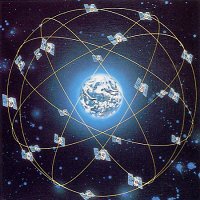

Continuing on the discussion of Galileo and associated hype - In an opinion piece running in a few international newspapers, Canadian journalist Gwynne Dyer refers to some critics of Galileo calling it “the Common Agricultural Policy of the sky”, a reference to the EU’s "expensive and wasteful farm support program". Dyer further goes on to suggest it's "not commercial" and it's "not political" but nonetheless goes on about the reason behind the Galileo launch being to lessen reliance on what is a US military system, arguing that should the US shut Navstar down or resume S/A, many mission critical systems, such as flight control could be adversely affected. Well, it still sounds at least partly political to me...
At a cost of 3.2 billion Euros, that's a lot of money spent on what-ifs, notwithstanding the fact that other systems are also online (GLONASS) and in the process of lauch.
Dodging (for the moment at least) the more caustic digs made by a few other articles covering the Galileo launch, that virtually characterize Galileo as a "slap in the face to the American Empire", I would contend the same availability argument potentially applies to any such system, be it NAVSTAR GPS, GLONASS or even Galileo itself. If there's a problem with one of the SVs, constellation geometry is affected, and positional accuracy declines significantly or can become wholly unavailable due to poor Geometric Dilution of Precision factors. As a composite factor, GDOP is intimately tied with all aspects of horizontal and vertical location, along with time.
GDOP = √ σn2 + σe2 + σh2 + σt2 + c2
As surveyors we know that GPS constellations and ability to collect usable data is variable, based on the ever-changing collection of SVs available at a given point in time, making mission-planning and long observations a good idea. And this is WITHOUT the vagaries of S/A or wartime activities. Additionally, for survey-grade work, we rely on such tools as CORS stations and OPUS to perform correction. What correction of Galileo data will be possible? What ultimate levels of geodetic accuracy can we expect? Also, the discussion of "interoperability" between Galileo, Navstar and GLONASS leaves me perplexed. Currently Navstar and GLONASS are separate and not interoperable, so how could Galileo be interoperable? That interoperability piece will play itself out in the receivers in the ground-based processing of the data, and has little to do with Galileo.
"Killer App" and hypeworthy Galileo is not, at least as I currently understand the system. Particularly if it, as paid-subscriber-based offering competing with others that are free. But on the other hand, if we ultimately end up with multiple systems and plenty of availability and redundancy, so much the better.
Technorati tags:
applications, eu, Galileo, geo, geodesy, geodetic, Geospatial, gps, interoperability, mapping, navigation, satellite, science, space, surveying




0 Response for the " Galileo Hype? "
Post a Comment